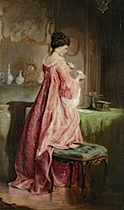 Okay, I know this is going to sound like a strange post, coming from someone who’s been out of school for several years. But I know what I’m talking about, here. School books are expensive!
Okay, I know this is going to sound like a strange post, coming from someone who’s been out of school for several years. But I know what I’m talking about, here. School books are expensive!
The 19th century was an exciting time around the world. It followed the American Revolution, the French Revolution, and covered the English Regency. It was the period of Wordsworth and the Romantics, Victorian England, Dickens, and pioneer America. It saw expansion in all ways, and the birth of the Industrial Revolution.
The 19th century is often called the “long 18th century” in literary studies because it spans the end of the French Revolution (1789) to the beginning of World War I in 1914. It was also sufficiently after the invention of the printing press and literacy was on the rise, so there are lots of books out there to be read, and most of them have survived to today.
The literature of this time is fairly exciting– there’s an almost equal weight between novels and poetry. Jane Austen wrote in the early 1800’s, so you have some romance novels if you’re looking for them. Mary Shelly wrote Frankenstein in 1818– science fiction! Jules Verne was later in the century.
And so many authors felt the disaffection in the face of the political chaos of their times, they wrote volumes and volumes on the conflicts of political strife, evolution and science, expansionism, and imperialism.
The length of the time period and the depth of material available from the 19th century has led to large amounts of scholarship and literary inquiry. As a result, there is no shortage of books available on Project Gutenberg and other free ebook sites. Many of these are also being read and recorded on Librivox, a public domain audiobook project.
Most undergraduate and even graduate courses focus on reading the text and then reading a selection of articles and excerpts (often presented in a photocopied “reader”), most of which, if you can get the list of articles from the professor, are available in your library’s archives or online documents (try JStor and other academic databases). You may also find that WikiSource is a good place for primary historical sources, though I haven’t reviewed it for sources relevant to 19th century literary study.
In essence, you’ll be able to source your primary texts for free and mine a wealth of secondary sources within your library’s walls or Internet connection. If you’re a fast reader, you may even finish your degree early– unlike math, science, and engineering majors, you do not have to take literature courses in any particular sequence. If you’re a really fast reader and writer, you can probably take an extra course in your major every semester and finish up to a year early.
Tip for high school seniors: Take AP English now to save yourself a semester or even two of basic writing and composition.
I do not recommend thinking that studying earlier eras will be a cheaper route. Anything prior to Shakespeare will hit your bank account, because of the need for translations from Middle or Old English, textbooks to learn Middle or Old English (not as easy to come by online for free), and the fact that there is less primary literature available to study, so you will need to read more secondary sources, which means purchasing literary analysis books and articles in your course reader.
I make no guarantees on your ability to get a job after college. I’m just talking about getting through school without spending $150 for each textbook. But I will point out that English majors with relevant backgrounds are accepted into med school and law school more often than any other major, due to the flexibility of their developed communication skills.
This plan is not recommend for: people who don’t like to read, people who cannot write an essay (most literature courses use the essay for the final exam and have 2-5 additional essays due throughout the course), or people who are only comfortable with quantifiable test-taking.
If I were coming out of high school and wanted to get a degree as inexpensively as possible, I would go to a community college for 2 years and get all my GE’s out of the way, taking the maximum number of transferrable lower-division literature courses as I could. I would then transfer to a state college or university and major in 19th century literature. I would check the book lists of each course I signed up for as soon as they were available in the college bookstore, and spend summer and winter vacations buying them for a few bucks at used stores, or downloading them for free on Project Gutenberg.
This is, in fact, what I did for my undergraduate degree– in some cases, I was able to fulfill the book lists of 3 classes in a quarter for under $30– and that was in 1995, before Project Gutenberg had really taken off. Today, I bet I could get through the major requirements for under $150 in textbooks, total (not counting the general education courses).